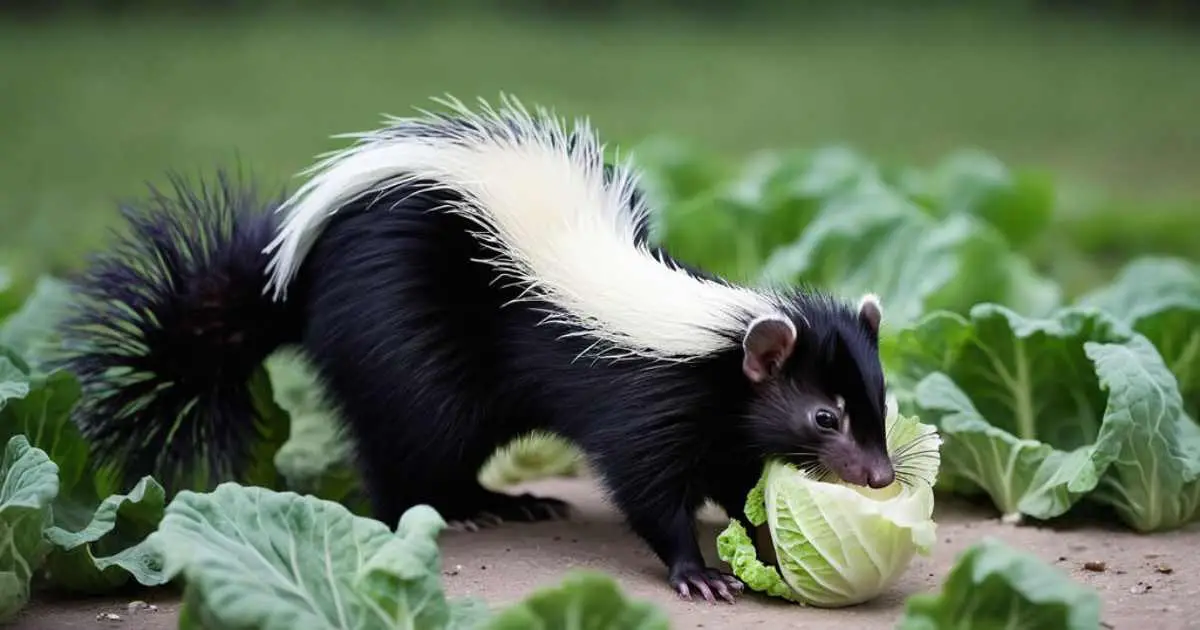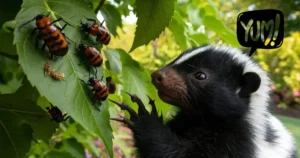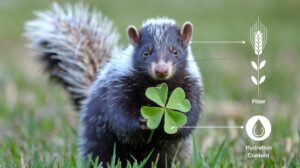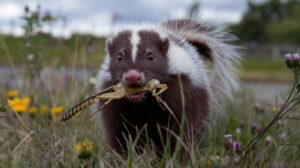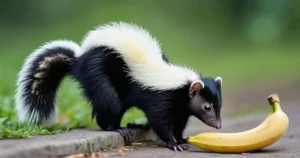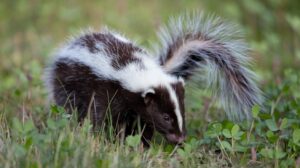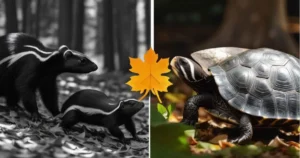Can Skunks Eat Cabbage? Find Out Here!
From my experience raising skunks and studying their behavior in the wild, I discovered that skunks have a taste for cabbage! These nocturnal critters aren’t picky eaters—they enjoy a mix of fruits, veggies, and even small animals. Want to learn more about their interesting diet and how they might help out in your garden? Stick around for the full scoop!
Skunk Diets And Preferences
Curiosity often strikes when we think about what skunks eat. Do skunks find cabbages appetizing? Understanding skunks’ diets helps us coexist with these creatures and even protect our gardens.
Natural Foraging Habits
Skunks are nocturnal foragers who search for food at night. They use their strong sense of smell to locate edibles. Skunks eat a variety of fruits, nuts, and insects. These include berries, grasshoppers, and beetles. Their search for food often leads them to gardens, where they might stumble upon cabbage.
Carnivore, Herbivore, Or Omnivore?
Skunks are omnivores; they eat both plants and animals. Their varied diet includes:
- Insects and grubs
- Small rodents
- Berries and leaves
Cabbage can certainly be part of a skunk’s diet if they find it during their nocturnal expeditions. They are not picky and will munch on fresh vegetables when available.
| Type | Examples |
|---|---|
| Animal | Insects, rodents, eggs |
| Plant | Fruits, nuts, vegetables like cabbage |
The Allure Of Cabbage To Wildlife
Imagine a lush garden with verdant cabbages peeking from the soil. This sight not only captivates gardeners but wildlife too. Cabbages are a favorite among many animals, including the enigmatic skunk. A garden can feel like a feast with its vibrant leaves and nutritious offerings. Let’s unearth the appeal cabbages hold for our furry foragers.
Nutritional Value Of Cabbage
Cabbage is loaded with goodness. It boasts vitamins, fiber, and minerals. For animals, these nutrients are vital for survival. Cabbage provides:
- Vitamin C: For a strong immune system.
- Fiber: For good digestion.
- Vitamin K: For bone strength.
- Folate: For cell growth.
These benefits explain why wildlife, like skunks, cannot resist cabbage.
Cabbage In The Wild Vs Gardens
In the wild, cabbage is uncommon. Animals often have to search hard for it. In gardens, however, cabbage is abundant. These ready-to-eat leafy greens are hard to ignore for a skunk passing by. It’s like finding an all-you-can-eat buffet in their world.
| Cabbage Location | Availability to Wildlife |
|---|---|
| Wild | Scarce |
| Gardens | Plentiful |
Skunks are omnivores. They enjoy plants and meat. Cabbage is perfect for them because it’s easy to find in gardens and nutritious.
Cabbage As Part Of A Skunk’s Diet
Skunks are known for their fondness for various foods, but is cabbage on their menu? This intriguing question leads to a deeper dive into the dietary habits of these distinctive mammals. As omnivores, skunks have a wide-ranging diet that may include vegetables like cabbage. Understanding the place of cabbage in a skunk’s diet reveals their adaptability and opportunistic feeding behavior.
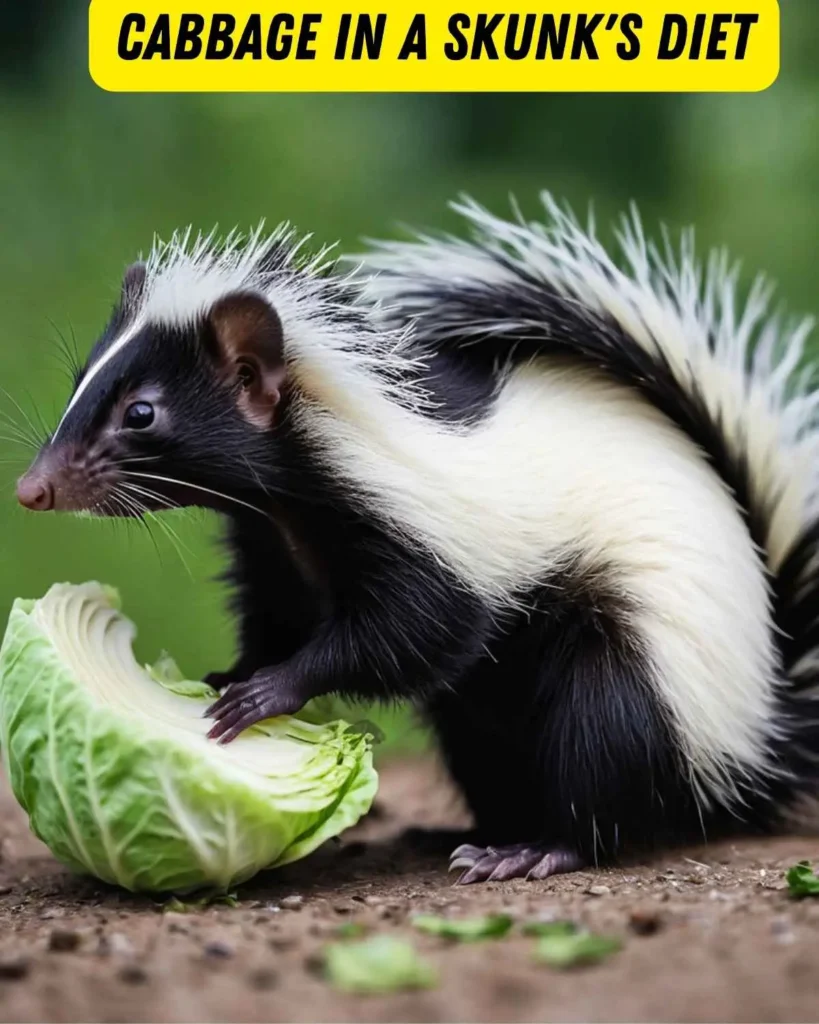
Observations From Wildlife Experts
Wildlife experts have observed skunks in their natural habitats to learn what they eat. These animals are omnivorous, meaning they can eat both plants and animals. Experts note that while skunks don’t seek out vegetables specifically, they won’t pass up a chance encounter with a garden. Seasonal availability and easy access can lead to skunks nibbling on cabbage. Here are some compelling reasons:
- Cabbage offers nutrition for skunks.
- Gardens can be tempting sources of food.
- They prefer easy meals when available.
Cabbage Consumption: Anecdotes Vs Facts
While anecdotes of skunks eating cabbage exist, hard evidence is limited. Personal stories from gardeners often report skunks consuming cabbage. Yet, scientific research on this specific behavior is less common. Below is a comparison:
| Source | Claims |
|---|---|
| Anecdotes | Gardeners report skunk-cabbage encounters. |
| Facts | Limited studies to confirm these claims. |
It’s important to distinguish observed behavior from speculation. While there’s a possibility that skunks do eat cabbage, the extent to which this happens is still to be determined through focused scientific study.
Skunks’ Foraging Behavior
Curious about skunks’ foraging behavior? Skunks are opportunistic eaters. This means they will consume a variety of foods. Their diet can include plants, insects, and small mammals. Gardens often attract skunks because they offer easy meals. Let’s delve into what this means for your cabbage patch.
Night-time Foraging Patterns
Skunks are primarily nocturnal creatures. They search for food at night. While foraging, these black and white mammals rely on their keen sense of smell. They sniff out food under the cover of darkness. Your garden may be at risk if it is not secured. Cabbage and other vegetables emit a scent that can lure skunks in.
Skunks And Vegetable Gardens
Vegetable gardens are a buffet for hungry skunks. Cabbage may be on their menu. They like the tender leaves and roots. To protect your garden, consider fencing or natural repellents. Skunks avoid strong smells like citrus peels or ammonia.
- Secure your garden with fencing.
- Use natural repellents around cabbage.
- Keep the area clean of waste that attracts skunks.
Protecting Your Cabbage Patch
Protecting Your Cabbage Patch from hungry critters is a vital task for any gardener. Skunks, known for their unmistakable smell, might surprise you by munching on your cabbage. Keeping these little guys at bay ensures your garden thrives. Learn practical tips on creating a skunk-free zone for your precious cabbage patch using effective fencing solutions and natural repellents.
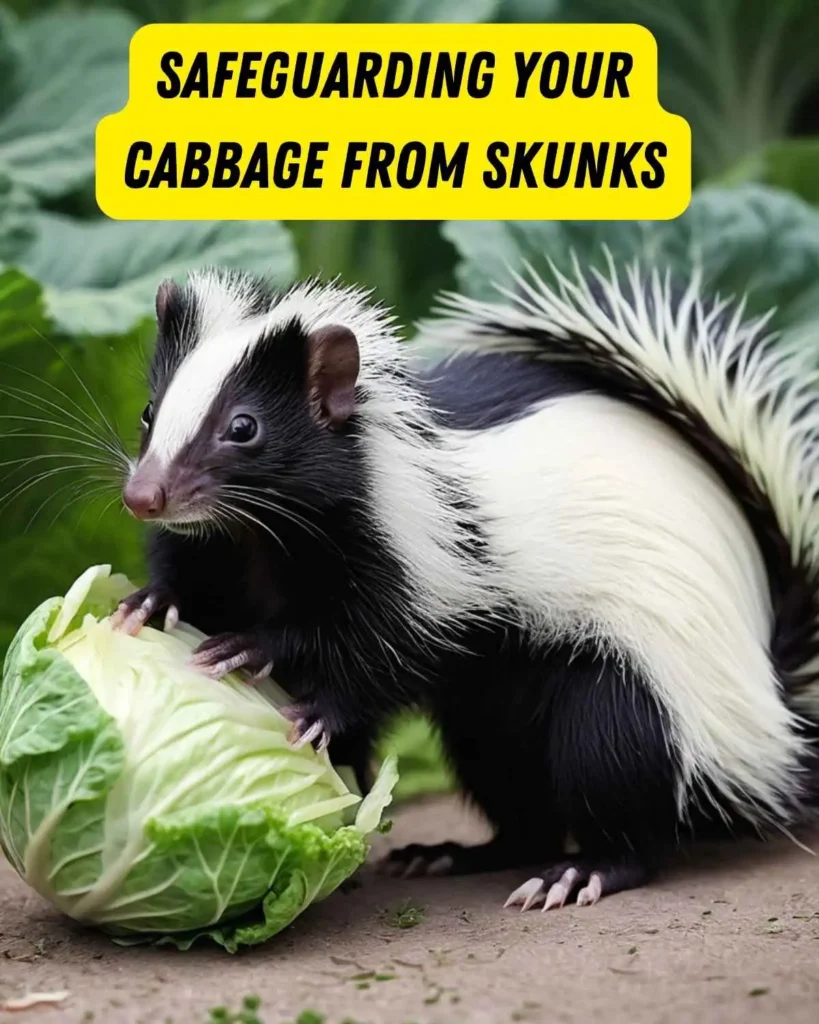
Effective Fencing Solutions
An impenetrable barrier is key to securing your cabbage. Skunks are skilled diggers, so your fence must be sturdy.
- Bury it deep: Extend your fence at least 1 foot underground.
- Height matters: Ensure your fence stands 3 feet tall to deter climbers.
- Material is critical: Choose strong wire mesh to withstand digging.
Secure the perimeter: Regularly inspect for holes or signs of skunk activity.
Maintain cleanliness: Remove any debris that might encourage skunk sheltering.
Natural Repellents
Chemicals can harm your garden. Opt for safer, natural repellents to keep skunks away.
| Natural Repellent | How to Use | Frequency |
|---|---|---|
| Citrus Peels | Scatter around your cabbage patch | Weekly |
| Pepper Spray | Combine pepper & water, spray soil | After rain |
| Predator Urine | Use coyote or fox urine granules | Twice a month |
Dog hair: Sprinkle around your patch, as the scent of a predator can deter skunks.
Motion-activated sprinklers: Startle and shoo away potential invaders.
Epsom salts: Sprinkle around for a dual purpose; they enrich the soil and repel skunks.
Impact Of Skunks On Agriculture
Skunks are notorious for their strong odor. Many overlook their impact on farms. They feed on a variety of urban and rural delicacies including insects, small rodents, and yes, even cabbage. Their diverse appetite sometimes leads them into conflict with agricultural spaces, where they can become unexpected pests to some crops.
Case Studies Of Skunk Incursions
Farmers tell tales of skunk visits. One study highlighted a farm in Ohio. Skunks were eating ripe cabbage heads. The impact was clear. Skunks reduced the cabbage yield significantly. Another study in California observed skunks digging for grubs, but they harmed the root systems of plants in the process.
- Ohio Farm: Noticeable decrease in cabbage yield due to skunks.
- California Farm: Damage to root systems while skunks hunted for grubs.
Balancing Ecosystems And Crop Safety
The presence of skunks indicates a healthy ecosystem. Yet, they can threaten crop safety. Strategies exist that protect both the environment and a farmer’s harvest. These strategies include fencing, using natural repellents, and maintaining cleanliness to avoid attracting skunks.
- Fencing: Install secure, skunk-proof fencing around sensitive areas.
- Natural repellents: Use non-toxic substances to deter skunks.
- Cleanliness: Remove food sources that may attract skunks.
| Action | Benefit |
|---|---|
| Fencing | Keeps skunks away from crops. |
| Natural repellents | Discourages skunks without harm. |
| Cleanliness | Reduces skunk attraction to farms. |
By understanding skunk behavior, farms can adapt. They can reduce unwanted encounters. They can also support the natural roles skunks play in the environment. This balance is key to a sustainable agriculture system.
Alternative Foods In Skunks’ Diets
Exploring the mystery of skunk diets takes us beyond the common myth that they solely dig through trash. Skunks exhibit diverse tastes when it comes to their food choices. Let’s delve into the alternative foods that skunks enjoy and how their diets can vary.
Typical Insects And Small Prey
Skunks love a good insect feast. They often hunt for protein-rich bugs and grubs. Their nightly foraging can lead them to a smorgasbord of:
- Beetles that scuttle across the forest floor
- Crickets chirping in the night
- Earthworms wiggling through the soil
These little creatures provide essential nutrients for skunks. Small rodents and frogs also occasionally fall into their diet. Skunks use their sharp claws to dig for these delicacies.
Seasonal Eating Habits
As seasons change, so does the diet of a skunk. They adapt their eating habits to what’s available:
| Season | Food Source |
|---|---|
| Spring | New plant growth, buds, mushrooms |
| Summer | Fruits like berries, insects |
| Fall | Fallen fruit, nuts, seeds |
| Winter | Food scarcity often leads to scavenging |
In warmer months, skunks relish a variety of foods. They munch on cabbage and other garden produce. Corn, fallen fruit, and nuts also top their menu. During cold months, they may eat less and conserve energy.
Human And Skunk Coexistence
Skunks often wander into our backyards, sparking curiosity and concern in equal measure. While they may enjoy a taste of our vegetable gardens, including cabbages, finding harmony between human habitats and skunk lifestyles is both fascinating and crucial. Here’s how we can understand and support our striped neighbors.
Understanding Skunk Behavior
Skunks are nocturnal creatures known for their distinct black and white coloring and potent spray. As omnivores, they feed on plants, insects, and small animals. Understanding their behavior is key to coexistence:
- Skunks seek food at night. Secure trash and gardens to deter them.
- They avoid conflict. Provide escape routes to prevent surprise encounters.
- Pets and skunks can clash. Keep pets inside at night to avoid sprayed incidents.
Creating Skunk-friendly Environments
A skunk-friendly environment balances skunk habits with our preferences. Here’s how to create a shared space:
- Use motion-activated lights. They startle skunks, keeping them at bay without harm.
- Leave natural hideaways. Brush piles and logs mimic skunk’s natural habitats.
- Maintain low fences. Skunks are poor climbers and will be discouraged by a simple barrier.
Frequently Asked Questions
Yes, skunks can eat cabbage. It should be given in moderation as part of a varied diet to ensure their nutritional needs are met.
Skunks often enjoy a variety of vegetables including corn, tomatoes, and leafy greens. They’re also fond of root vegetables like carrots and potatoes.
Certain foods are harmful to skunks, such as chocolate, caffeinated beverages, alcohol, onions, garlic, and any salty or sugary treats. Always avoid feeding skunks these toxic items.
Conclusion
Understanding the dietary habits of skunks is essential for gardeners keen on safeguarding their cabbages. Skunks may not rank cabbage as a top food choice, but they’ll eat it when other foods are scarce. By employing strategic deterrents, you can protect your leafy greens from these nocturnal visitors and maintain a thriving garden.
Keep your cabbage patch safe and skunks at bay with knowledge and the right tactics.

